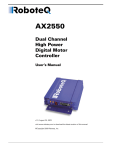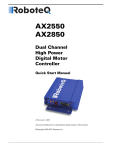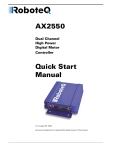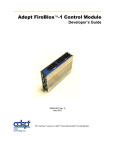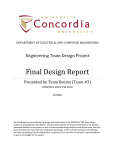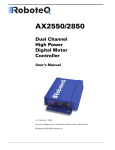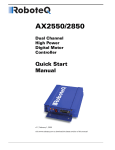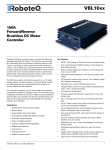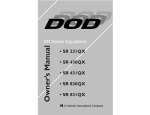Download RoboteQ Dual Channel Digital Motor Controller AX2550 User`s manual
Transcript
AX2550 Dual Channel, Forward/Reverse Digital Speed Controller 2 x 120 SmartAmps for Remote Controlled and Computer Guided Robotic Vehicles oboteq’s AX2550 controller is designed to convert commands received from a R/C radio, Analog Joystick, wireless modem, or microcomputer into high voltage and high current output for driving one or two DC motors. Designed for maximal easeof-use by professional and hobbyists alike, it is delivered with all necessary cables and hardware and is ready to use in minutes. Key Features Benefits Microcomputer-based digital design Accurate, reliable, and fully programmable operation R/C mode support Connects directly to simple, low cost R/C radios Serial mode support Connects directly to microcomputers for autonomous operation or to wireless modem for two-way remote control The controller's two channels can either be operated independently or mixed to set the direction and rotation of a vehicle by coordinating the motion on each side of the vehicle. The motors may be operated in open or closed loop speed mode. Using low-cost position sensors, they may also be set to operate as heavy-duty position servos. Analog mode support Connects directly to analog joystick Built-in power drivers for two motors Supports all common robot drive methods Up to 120A output per channel Gives robot strongest lifting or pushing power Smart automatic current limitation Protects motors, wiring and battery. High reliability The AX2550 can be reprogrammed in the field with the latest features by downloading new operating software from Roboteq’s web site. Numerous safety features are incorporated into the controller to ensure reliable and safe operation in the most demanding mobile robotic vehicle applications. Open loop or closed loop speed control Low cost or higher accuracy speed control Closed loop position control Create low cost, ultra-high torque jumbo servos Data Logging Output Capture operating parameters in PC or PDA for analysis Built-in DC/DC converter Operates from a single 12V-40V battery Extruded aluminum, heat sinking enclosure Operates in the harshest shock and temperature environment Field upgradable software Never obsolete. Add features via the internet R © copyright 2002-2003. Rev 1.3 August 25, 2003 give your robot muscle with brains Roboteq’s AX2550 controller is designed to fit a wide range of mobile robotic vehicle applications. Its compact size, high power drive capability, advanced safety features and multiple command modes make it the preferred choice for autonomous or remotely operated robots, such as: ● Automatic Guided Vehicles ● Law Enforcement Robots ● Hazardous Material Handling Robots ● Personal Transport Systems ● Underwater Remote Operated Vehicle ● Surveillance Robots ● Telepresence systems ● Bomb and Mine Removal robots ● Battlebots ● Remote Exploration Robots ● Animatronics ● Life-size model cars or boats ● ... and many others easy to install anywhere The AX2550 is designed for simple installation in a variety of robotic vehicles. The controller is fitted with heavy gauge cables for direct connection to high amperage batteries and motors. Optional Speed or Position Sensors DC Motors Up to 5HP on each channel A convenient 15-pin connector is used for the following low voltage connections: ● 2 or 3* channel radio receiver inputs ● RS232 communication port ● Analog inputs for applying commands, or connecting to optional speed, position or motor temperature sensors ● Input for Emergency Stop switch or “inverted” switch for detecting when the robot is turned upside-down to Optional ● a 2A solid-state switched output for controlling a Motor Temperature brake, weapon or other accessory. Sensors ● one low-current on-off output ● two digital input for user-defined sensors ● a regulated 5V supply output for powering the R/C 24V, 2A switched radio (Battery Eliminator Circuit). output *3rd R/C channel is needed to activate accessory/weapon outputs in R/C mode Optional 12V Supply for Controller Electronics 12 to 40V Battery Power Supply tes eR teS R/C Receiver, Wireless Modem, or Microcomputer low-level digital output 2 digital inputs Emergency Stop or "Inverted" switch multiple input modes The AX2550’s multiple command input modes - R/C Radio Pulse Width, Serial Port or Analog - make it uniquely interfaceable to all types of microcontrollers, remote control radios, or other command devices. tes eR teS R/C Radio Mode R/C Pulses R/C Radio is the most popular, simplest and least expensive method to build and operate a remote controlled robot. In this mode, the controller supports many configurable options, including joystick calibration of min, max and center positions and deadband adjustment. 802.11 WLAN or RF Modem Serial Port (RS232) Mode tes eR teS Microcomputer RS-232 Using the serial mode, the controller may be interfaced to a microcomputer for autonomous operation. Using a wireless modem or wireless network adapter (802.11), more advanced remote control operations are possible, including remote control via the internet. Analog Mode A simple 0-5V analog control mode is also provided for direct connection to potentiometers or analog joysticks. tes eR teS Analog Visit www.roboteq.com for detailed applications examples and design tips. programmable command corrections Motor Output (Forward) logarithmic When used in the R/C or Analog mode, the AX2550 can be configured to automatically correct and compute an adjusted motor command value. proportional Programmable Deadband Adjustment exponential When used in the R/C or Analog mode, the controller allows a selectable amount of joystick motion from its center position before it begins applying power to the motors. This feature ensures a safe start and smooth operation for the robot. Command deadband Exponentiation Adjustment Motor Output (R ) After the joystick moves past the deadband position, the AX2550 can be set to add an increasing (exponential) or decreasing (logarithmic) amount of power to the motor. This allows the operator to set the robot’s best driving characteristic for a particular use. Automatic Joystick Calibration With the push of a button, the min, max and center positions of the R/C joysticks can be captured and stored in the controller. Because of this feature, the AX2550 will deliver on the full joystick travel position and will always start at a safe idle position. max min max center min multiple command modes The AX2550 may be connected to two motors which will react to commands received on two input channels. Using these two channel inputs, the motors can be commanded independently or in a combined fashion to accommodate the most common drive and steering methods in robotic vehicles. Independent Speed Commands In this mode, each of the two motors is commanded independently of the other. This operating mode is best suited for generic motor control applications. Ch1 controls Motor 1’s speed Ch2 controls Motor 2’s speed Mixed Speed/Steering Commands In this mode, the motors work in combination to move and turn a vehicle by combining the forward/reverse command information and the left/right steering information. This mode of operation provides a cost effective method for moving and steering tank-style robots and underwater vehicles. Ch1 and Ch2 are mixed to control Motors 1 & 2 in coordination Speed and Position commands In this mode, one channel is used to control the forward/reverse motion of the vehicle. The other channel is used to make the motor work like a position servo which can be then connected to a steering column. This mode is the most energy efficient as no power is lost to friction due to skidding. Ch1 controls Motor 1’s speed Ch2 controls Motor 2’s position Dual Position Commands In this mode, each channel independently controls the angular position of one motor. The heavy duty servos built in this way can be used to control throttle, brakes, and steering of life-size vehicles or animate any large and heavy structure. Ch1 controls Motor 1’s position Ch2 controls Motor 2’s position multiple motion modes For each channel, the AX2550 supports multiple motion control modes: Open Loop Speed mode In this mode, the controller delivers an amount of power proportional to the command information. The actual motor speed is not measured. This mode is adequate for most applications where the operator maintains a visual contact with the robot. Tachometer Speed Feedback Closed Loop Speed mode In this mode, an analog tachometer measures the actual motor speed. If the speed changes because of changes in load, the controller automatically compensates the power output. This mode is preferred in precision motor control and autonomous robotic applications. Position Feedback Potentiometer Closed Loop Position mode In this mode, the axle of a geared down motor is coupled to a potentiometer that is used to compare the angular position of the axle versus a desired position. This unique feature makes it possible to build ultra-high torque “jumbo servos” that can be used to drive steering columns, robotic arms, life-size models and other heavy loads. Gear box efficient power stages output The AX-2550 includes two high-efficiency Power Output stages which can operate from 12 to 40VDC. Each of these stages supports the following advanced features: Precise, Smooth, Forward/Reverse Control High efficiency MOSFET “H-Bridges” are used for full forward and reverse operation. The controller uses Pulse Width Modulation at 16kHz to generate smooth, variable output power in as little as 0.5% increments. 120 SmartAmps per Channel The AX2550 features intelligent current sensing and control. After an initial surge allowed up to over 200A per motor, the controller will limit the power to 120A for the time typically required to accelerate or brake the robot. If the motor’s current draw remains excessive after that time, as in the case of stalled motor or other unusual loading, the controller will gradually reduce the power based on the measured MOSFET’s temperature. The MOSFET transistors are mounted directly against the heat-sinking extruded aluminum case for efficient cooling without the need of a fan in most applications. Controlled Motor Acceleration The AX2550 can also be configured to automatically “smooth” command changes (from stop to full speed, for example) to avoid sudden overloads on the controller, the batteries and/or the robot’s mechanical components. simple and fail-safe operation For all its sophistication, the AX2550 is very simple to install and operate. Its many configuration options are programmed using only two switches and a LED display on the controller front panel. The controller may also be connected to a PC for setting configuration parameters using a convenient Graphical User Interface. Once programmed, the configuration data are stored permanently in the controller's non-volatile memory, eliminating the need for cumbersome and unreliable jumpers. During normal operation, the LED display provides running and alarm indication. The AX2550 is fitted with many safety features ensuring a secure power-on start, automatic stop in case of command loss, overcurrent protection on both channels, and overheat protection. A temperature sensor will shut down the power stage and protect the controller in case of overheating. PC-based configuration & monitoring software While the AX2550 can be configured and operated using it’s built-in switch and display, for added convenience the controller is delivered with a PC utility and connection cable that will allow you to perform the following functions: ● Read and set the programmable parameters with a user-friendly graphical inter-face ● Obtain the controller’s software revision and date ● Send precise commands to the motors ● Read and chart real-time current consumption value, heatsink temperature, motor temperature and battery voltage For monitoring the controller while operating the robot in its intended environment, the AX2550 is delivered with a Data Logger software for Palm Pilot® PDA’s, capable of recording 12 operating parameters for up to 30 minutes. Using the PC and an internet connection, it is also possible to download and install software updates to the controller in order to improve existing features or enable new ones as they become available. This unique capability keeps the AX2550 from ever becoming obsolete. Upon request, Roboteq will also perform custom modifications to the embedded software to meet specific user’s requirements. sturdy and lightweight construction 3.00" (76 mm) 4.00" (102 mm) 5.50" (140 mm) The AX2550 is built into a extruded aluminum case which also serves as a heat sink for its electronics. The large fin area ensures sufficient heat dissipation for operation without a fan in most applications. 0.25" (6.3 mm) Mounting brackets on each end are provided for durable assembly of the controller onto any robot chassis. Optional shock mount absorbers may be added for use in the most brutal environment. 7.00" (178 mm) The 15-pin connector includes mounting nuts to secure a permanent connection with the radio receiver or microcomputer and the various external sensors. At 2lbs (900g), the AX2550 is the most compact and lightweight motor controller in its class. 8.00" (203 mm) 9.00" (228.5 mm) 1.60" (40 mm) Program Set Reset 4.00" (102 mm) 5.50" (140 mm) ready to work right out of the box The AX2550 controller is delivered complete with the hardware, cables, and software necessary for its operation. The controller’s factory default settings will satisfy the most common robot designs so that it can be installed and operated within minutes of unpacking. The controller is supported by a detailed and illustrated User’s Manual, including a 10-page Quick Start section and over 150 pages of Reference Information. Package Content ● AX2550 controller fitted with power cables ● R/C radio adapter cable ● Serial Communication cable ● Quickstart Manual ● CD containing PC Configuration Software, and complete User’s Manual. Ordering References AX2550 Dual Channel Forward/Reverse Speed controller up to 40V and 120A SmartAmps per channel Partial references listing only. Order on-line at www.roboteq.com or from your local distributor technical specifications Fully Digital, Microcomputer-based Design Low Power Consumption ● Multiple operating modes ● Fully programmable using either built-in switches and 7 segment LED display or through connection to a PC ● Non-volatile storage of user configurable settings. No jumpers needed ● Simple operation ● Software upgradable with new features ● On board DC/DC converter for single 12 to 40V battery system operation ● Optional 12V backup power input for powering safely the controller if the main motor batteries are discharged ● 200mA at 12V or 100mA at 24V idle current consumption ● Power Control wire for turning On or Off the controller from external microcomputer or switch ● No consumption by output stage when motors stopped ● Regulated 5V output for powering R/C radio. Eliminates the need for separate R/C battery. Multiple Command Modes ● Radio-Control Pulse-Width input ● Serial port (RS-232) input ● 0-5V Analog Voltage input Multiple Advanced Motor Control modes ● ● ● ● ● Independent channel operation Mixed control (sum and difference) for tank-like steering Open Loop or Closed Loop Speed mode Position control mode for building high power position servos Modes can be set independently for each channel High Efficiency Motor Power Outputs ● ● ● ● ● Automatic Joystick Command Corrections ● ● ● ● Joystick min, max and center calibration Selectable deadband width Selectable exponentiation factors for each joystick 3rd R/C channel input for accessory output activation Special Function Inputs/Outputs ● 2 Analog inputs. Used as ▲ Tachometer inputs for closed loop speed control ▲ Potentiometer input for position (servo mode) ▲ External temperature sensor inputs ▲ User defined purpose (RS232 mode only) ● One Switch input configurable as ▲ Emergency stop command ▲ Reversing commands when running vehicle inverted ● Up to 2 general purpose outputs for accessories or weapon ▲ One 24V, 2A output ▲ One low-level digital output ● Up to 2 digital input signals Built-in Sensors ● Voltage sensor for monitoring the main 12 to 40V battery ● Voltage monitoring of internal 12V ● Temperature sensors on heatsinks of each power stages Advanced Data Logging Capabilities ● 12 internal parameters, including battery voltage, captured R/C command, temperature and Amps accessible via RS232 port ● Data may be logged in a PC, PDA or microcomputer ● Data Logging Software supplied for PC and Palm Pilot PDA ● ● ● ● ● Two independent power output stages Dual H bridge for full forward/reverse operation Ultra-efficient 2.5 mOhm ON resistance MOSFETs 12 to 40 V operation SmartAmps Automatic current limitation based on actually measured transistor temperature. ▲ 120A up to 15 seconds (per channel) ▲ 100A up to 30 seconds ▲ 80A extended Longer high Amps operation with forced cooling High current 8 AWG cable sets for each power stages 250A peak Amps per channel 16 kHz Pulse Width Modulation (PWM) output Heat sink extruded case Advanced Safety Features ● Safe power on mode ● Optical isolation on R/C control inputs ● Automatic Power stage off in case of electrically or software induced program failure ● Overvoltage and Undervoltage protection ● Watchdog for automatic motor shutdown in case of command loss (R/C and RS232 modes) ● Large and bright run/failure diagnostics on 7 segment LED display ● Programmable motors acceleration ● Built-in controller overheat sensors ● External motor temperature sensing and protection ● Emergency Stop input signal and button Sturdy and Compact Mechanical Design ● All-in-one design. Built from aluminum heat sink extrusion with mounting brackets ● Efficient heat sinking. Operates without a fan in most applications. ● 9” (228.5mm) L, 5.5” W (140mm), 1.8” (40mm) H ● -20o to +70o C operating environment ● 2 lbs (900g) 1601 E. Sharon Dr. Phoenix, AZ 85022, USA email: [email protected] w w w. r o b o t e q . c o m Made in USA








